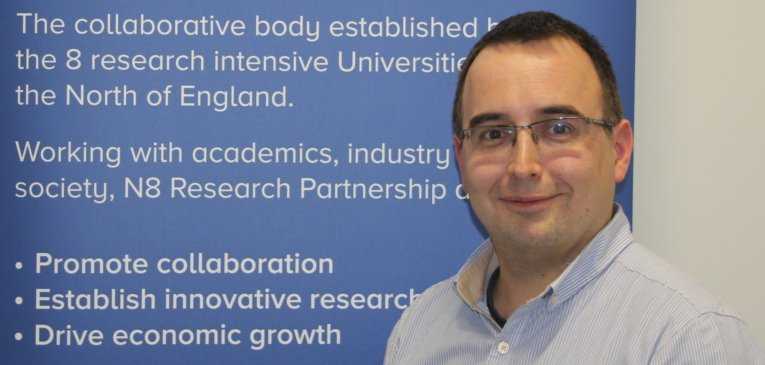
The final government-commissioned reports from four Science and Innovation Audits (SIAs) involving several N8 universities have highlighted Northern regional strengths in the Bioeconomy, offshore renewable energy, medical technologies, materials chemistry, high performance & cognitive computing and infection.
The findings of the audits for Leeds City Region, Liverpool City Region and partners, the North of England Bioeconomy sector and the North of England & Scotland offshore renewable energy sector were announced last week by Business Minister Lord Prior.
The UK government commissioned SIAs to develop a new approach to regional economic development. The reports aim to help the UK regions analyse their strengths and identify mechanisms to fulfil their economic potential.
The Leeds City Region audit found that that a £200-£250 million investment into the region’s medical technology sector could generate around an extra 4,000 jobs, taking employment in the sector to around 15,000 workers.
The Leeds City Region has a long association with the med-tech sector, through the manufacture of medical devices and cutting-edge research at the region’s five universities.
The report also recommended that there should be the establishment of a clinical evaluation hub – a ‘test bed’ – where med-tech companies can work with the NHS as well as the creation of a med-tech skills academy and a med-tech innovation hub supporting companies from research through to evaluation and market – with advice on business support and finance.
The SIA, ‘Opportunities and Growth: Medical Technologies’, has been led by Professor John Fisher from the University of Leeds, in partnership with the Leeds Enterprise Partnership (LEP), the region’s universities and local businesses.
He said: “We’ve painted an important picture of the region’s strengths, which can help the government make informed investment decisions and take advantage of the global opportunities. Leeds City Region is uniquely well-placed; we have a vibrant, highly-regarded and well-established base to really drive economic growth and the UK’s reputation in the med-tech sector. ”
In Liverpool City Region three areas of excellence have been highlighted: world class materials chemistry capabilities; creating a cluster of anchor and high growth companies to take advantage of global market opportunities in tackling infectious diseases; and hHigh performance & cognitive computing, to accelerate cross-sector growth and productivity, public sector transformation, and develop a world-class data-centric and disruptive digital technologies cluster.
Professor Anthony Hollander, Pro Vice Chancellor for Research & Impact, University of Liverpool, said: “The Science and Innovation Audit is an important asset for the Liverpool City Region. The University was delighted to play a key role in its development and we’re looking forward to working with partners to use it in helping to create new knowledge, businesses and jobs.”
The SIA into the North of England Bioeconomy, led by the University of York shows that the region has the facilities, specialised research and innovation capability and industrial capacity to deliver a world-leading bioeconomy, which generates £91 billion and employs more than 400,000 people.
The consortium’s vision is one of an integrated and innovation-driven product, process and service bioeconomy in the north of England, allowing the region to compete in the multi-trillion-pound global market for sustainable food, feed, chemicals, materials, consumer products and energy.
The report reveals the north of England has particular strengths in chemicals, process industries, and in food and drink. Food and drink represents around one-third of the regional bioeconomy and chemicals make up one-quarter.
Professor Koen Lamberts, Vice-Chancellor at the University of York, said: “The north of England has huge capabilities in areas such as agri-science, agri-technology, and industrial biotechnology, with the potential to address some of the UK’s biggest societal challenges.”
The audit of the offshore renewable energy industry in the North of England and Scotland, led by Newcastle University highlights the area’s world-class research in the field of offshore renewable energy, the strong supply chain, and the many innovation programmes and strong collaborations between industry and academia.
It focused on the international competitiveness of the research and innovation activities in offshore renewable energy, the future needs in innovation and the skilled workforce in the sector and looked at the offshore renewable energy sector at major ports in the North East, Tees Valley, Humber and Liverpool local enterprise partnership areas and Scotland. Liverpool and Durham Universities also contributed to the research.
Professor Nick Wright, PVC Innovation and Business, Newcastle University, said: “It was a great pleasure to see the wonderful progress being made across the board from offshore wind to wave and tidal energies and also see the future potential for this region. The report highlights some major opportunities for the cluster in terms of new technologies and we look forward to working with the Government to drive those forward.”
Dr Nick Goldspink, interim N8 Director, said: “The publication of this latest round of SIAs from the North demonstrates the breadth and depth of research and innovation assets in the region and, building on the SIAs from the first wave, creates a significant evidence base to drive investment and economic growth.”